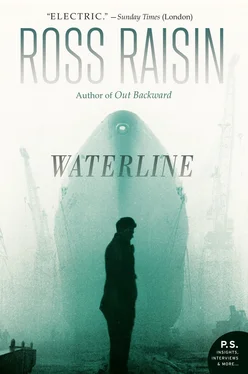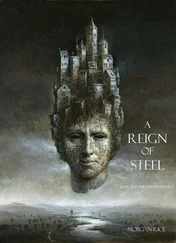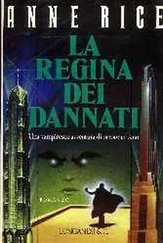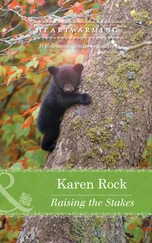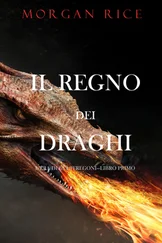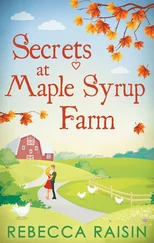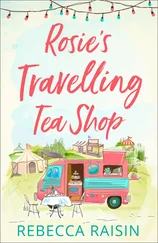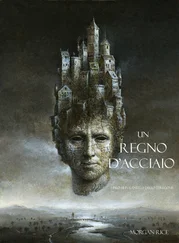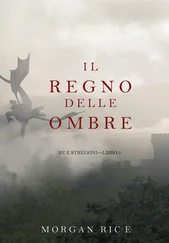Ross Raisin - Waterline
Здесь есть возможность читать онлайн «Ross Raisin - Waterline» весь текст электронной книги совершенно бесплатно (целиком полную версию без сокращений). В некоторых случаях можно слушать аудио, скачать через торрент в формате fb2 и присутствует краткое содержание. Год выпуска: 2012, Издательство: Viking, Жанр: Современная проза, на английском языке. Описание произведения, (предисловие) а так же отзывы посетителей доступны на портале библиотеки ЛибКат.
- Название:Waterline
- Автор:
- Издательство:Viking
- Жанр:
- Год:2012
- ISBN:нет данных
- Рейтинг книги:3 / 5. Голосов: 1
-
Избранное:Добавить в избранное
- Отзывы:
-
Ваша оценка:
- 60
- 1
- 2
- 3
- 4
- 5
Waterline: краткое содержание, описание и аннотация
Предлагаем к чтению аннотацию, описание, краткое содержание или предисловие (зависит от того, что написал сам автор книги «Waterline»). Если вы не нашли необходимую информацию о книге — напишите в комментариях, мы постараемся отыскать её.
Waterline — читать онлайн бесплатно полную книгу (весь текст) целиком
Ниже представлен текст книги, разбитый по страницам. Система сохранения места последней прочитанной страницы, позволяет с удобством читать онлайн бесплатно книгу «Waterline», без необходимости каждый раз заново искать на чём Вы остановились. Поставьте закладку, и сможете в любой момент перейти на страницу, на которой закончили чтение.
Интервал:
Закладка:
Beans isn’t listening. His head is sunk down, looking at the grass. There is a scorched patch in front of where they are sitting.
‘Anyway, so by the time his mate’s clocked what’s going on the poor guy is almost fried, and when he comes back from the hospital he’s got third-degree burns and everyone’s telling him he should go the courts but he says he’s no gonnae because it was his own fault for no doing the neck studs up.’
‘This supposed to be cheery?’
Mick turns round, relieved. ‘Right, sorry.’ He smiles. ‘Sorry. See what I mean is it could’ve been worse.’ Beans is looking now at the banana and crisps, not moving. His lips are swollen and bluish. ‘Worse,’ he says, in a quiet voice.
There is the problem of food and also, now, the problem of where to stay. They don’t discuss it but it’s clear enough they need to move from the park. As well, Beans is in blatant need of some medical attention. When Mick says they should go the hospital, however, he just gives a wee laugh. It’s the only thing he responds to all afternoon. The rest of the time he just sits there in silence, pulling the coat around him and covering his wounds, but Mick can see well enough what like the state he is in: his face and neck hugely swollen by now, and the top of the coat soaked with whatever it is that’s running out of his sores.
Later, Mick gets up and tells him he’s going off to find some food. He starts down the road, looking in the bins. A few people watching him as he gets grubbing inside them but he’s too hungry to care, pulling and digging at all this stuff that the residents have decided isn’t fit for them any longer: magazines, a bunch of flowers, newspapers with this picture of a politician type on the front. There is food too, plenty of it. Sandwich cartons, some with just the crust left, but a couple that there’s actually an entire half-piece in there. Unfuckingbelievable, really. In another bin he finds a Japanese roll left in one box and two more with these pink pickled frillies on the side. He gets it all into a pair of sandwich cartons and leaves back to the park.
He lays it all out on the bench. Beans nods his head slightly — one eye is half closed, the lid above it pink and inflamed — then he stares off again without touching the food, back into whatever it is he’s thinking.
They wait it out the afternoon until the light starts to change and Mick gets them on the move. Beans doesn’t argue. He doesn’t do anything, just keeps cloyed up, loundering slowly behind as they go down the road. They come again to the doctor’s practice. He leads Beans down a path to the back of the building. All the lights are turned off and the car park is empty, so he lays the blanket down under an archway by the back door. He sits Beans up against the wall and sets off for more food.
Strange but it’s gave him something of a punt up, what’s happened. Fucking terrible, of course, he’s a terrible bastard to think it but it’s true. He feels more of a purpose about him. It’s down to himself the now. Showing Beans that he’s no just some leech that can’t get by on his own. He can be useful. He is being useful. After a long walk he finds a full bin round by a kebab shop. A few looks but so what? Go fuck yourselves. On the way back, it starts to rain. He gets a hurry on, clutching the warm carton of collected chips and doner meat under his jacket.
Beans has moved. The blanket is laid out still, an empty carrier beside it. The rain tearing out from a gutter, hammering onto the concrete.
He eats half the food. Watches the yellow flowers over in the bed, nodding, drooping. Puddles growing in the car park. Which gives him an idea, and he gets up to go on another bin search, eventually finding an empty Coke bottle. Nobody on the street but. When he returns to the pitch he props the bottle with a stone out in the rain.
With the damp, and no overcoat, he sleeps fitfully the night, waking frequently with the same familiar sense of alarm. The blanket bare next to him. By morning, the rain has stopped, and the bottle is filled up quite a bit, stood there in the half-light of the glistening car park. Beans is gone still. He stays there, awake, the sun coming up and the sound of traffic increasing on the road, until eventually there’s no choice but to move on before anyone arrives.
He sits on top of a wall across the road, watching the entrance to the car park. The cleaner arrives. He watches the dim shadow of him through a window, slowing passing the mop. Doctors. Patients. A woman with a screaming snapper in a pram, halting and shouting at it to get shut up.
There is curtain-twitching going on behind him. He can see the movement in the corner of his eye when he turns his head to look down the road. Next thing the meat wagon will be blaring up the way, nay doubt. Well, get to fuck, then, he isn’t doing anything; he’s just sat there. But then what happens, it’s no the polis, it’s the man of the house opening the door and coming out. ‘Excuse me.’ The wife in the doorway behind, in her dressing gown. He’s got a T-shirt on — DUBLIN MARATHON FINISHER — and he means business: it’s his wall, get the fuck off it. ‘Excuse me, can I help you?’ Mick starts to laugh. The residents don’t know what to make of that though, they’re exchanging glances, wondering what’s their next move. Aw, sod off, and he hops down from the wall, gets walking away down the pavement. That’s him, then. No use waiting there any longer, so he decides to go to the river and check the veranda.
No sign of him. A hundred places he could be.
He spends the night at the doctor’s. Cold, shaking. Panic sticking the boot on at every turn and keeping him from sleep.
The familiar places: the river, the park — he even starts toward the day centre one morning, but then as he’s on the approach he turns about. An ache is growing inside him, taking over the whole of his body. Hunger, for one thing. Something else but. Too big. It’s too big. A sense that is inseparable as well from needing a drink — a pure desperate fucking need for one. So he starts going up the coach station again. It takes him a long while to walk there, using the wee bus stop maps and getting lost all the time but so what? Kills the time. Can ye spare any change, madam? Spare any change, sir? They can’t. Or some of them can, but most of them give him turned shoulders and the silent treatment. He doesn’t care. He needs a drink, simple as that, and everything else — it’s all a great blank space above the clouds, himself lying there on top with the hands behind the head and the blanket underneath him, slipping and floating across like he’s on a magic carpet. Any change, sir? Ye don’t? Nay danger, don’t worry, don’t worry. An auld hen, her hands tucked together, that way auld ladies do, fingering in her bag. God bless ye, madam. A man gives him his apple and he goes over to Newcastle to eat it, hid inamongst the legs and dragged suitcases as the driver appears with his cup of coffee, climbing onto the coach and getting the doors open. A few moments of noise and bustle. Singsong voices. A wee man walking past, joking with his mate. Somebody he minds him of. Who? Sure there’s somebody, and then he does mind — Ken — and he smiles at the memory. A great guy. About four foot two in his work boots, and a smile like a shopping trolley pulled out the river. One of the platers at Swan Hunter. This great singing voice he had on him, always belting out something or other — ‘You ain’t seen nothing like the Mighty Quinn’ — that was one he was always giving it, because Newcastle had this striker at the time that was banging in thirty goals a season.
The bay is thinning out now, a line of people forming outside on the coach park.
The other thing about Ken, most people never guessed until it was too late, he was a serious hardman. He’d bring in his own pieces every day, which the wife had made for him in these neat paper bags. Ham and pease pudding. Every day. He was aye particular about it. What sandwiches you brought today, Ken? And it was funny because he never knew you were kidding, he was that proud of the wife’s pieces. So one day this plater’s helper called Tommy Lambton thinks it’ll be a great joke to take the pieces from under his work bench and hide them while he isn’t looking. Come lunch break and Ken’s raging. Which of you’s took em, then? And suddenly he’s got the whole plating squad lined up, blank-faced, because in fact nobody does know where they are, until eventually young Tommy can’t hold it in any more and he starts knotting himself — they’re here, Ken, and he hands the sandwiches back, fair squashed and grubby by now. That’s the end of it, as far as anybody thinks. But later the lunch break Tommy is in the canteen sat down eating, yapping about the great trick he’s pulled, when in steps Ken, who comes toward the table and, calm as a waiter, picks up Tommy’s plate and walks off with it. Then they’re all following him through the yard like he’s the Pied Piper, Tommy included, quiet as a mouse now and with this black-affronted look on him, as Ken goes up to the launching berth and tips the food into the water. Then he hands the empty plate back to Tommy and leaves, all the rest of them watching this pie case slowly floating down the Tyne. One guy joking that it just goes to show how much filling they put in those bloody pies.
Читать дальшеИнтервал:
Закладка:
Похожие книги на «Waterline»
Представляем Вашему вниманию похожие книги на «Waterline» списком для выбора. Мы отобрали схожую по названию и смыслу литературу в надежде предоставить читателям больше вариантов отыскать новые, интересные, ещё непрочитанные произведения.
Обсуждение, отзывы о книге «Waterline» и просто собственные мнения читателей. Оставьте ваши комментарии, напишите, что Вы думаете о произведении, его смысле или главных героях. Укажите что конкретно понравилось, а что нет, и почему Вы так считаете.
